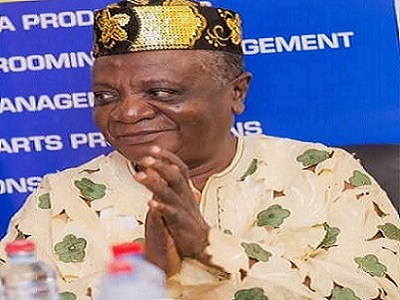The late Nana Kwame Ampadu
Veteran highlife musician, Nana Kwame Ampadu, leader and founder of the African Brothers International Band, has died aged 76.
Paa Steele, as he was fondly called in his heyday, was a household name in the music industry locally and beyond the shores of Ghana; his fame spanning between the early 70s and 90s.
Social events like funerals and parties were incomplete without one of his many hits.
He reportedly passed on yesterday at the Legon Hospital in Accra.
The cause of his death is unknown but the highlife king has not been well for sometime now.
His music genre appealed to young and old, his mastery and control of the lead guitar standing him apart from his contemporaries.
The renowned musician, whose death came as a shock to many industry stakeholders and fans, was considered as the king of Ghana’s highlife music and is also regarded as the Ghanaian artiste with most albums in the history of Ghanaian music industry.
Known for his brilliant storytelling skills through music, he composed and recorded songs about money, love and marriage, good citizenship, greed, drunkenness, death, road manners for commercial drivers, among others.
Nana Ampadu produced over eight hundred songs including Aku Sika, Kofi Nkrabea, Mentumi Ngyae Wo, Agartha, Aye Se Ye Do Wo, Obra, Drivers, Anibere Nnye, Oman Bo Adwo, and a host of others.
Ebi Ti Yie, Aku Sika and So Mu Gye Adowa were some of the hits which gave the music maestro a special standing; the titles sweeping across the country at a time when social media was not in vogue and music propagated through radio.
It was the storytelling tilt in his songs which appealed to a lot of people, urban and rural.
Born on March 31, 1945, Nana Ampadu formed his African Brothers Band in 1963 which had the late Snr. Eddie Donkor as one of the founding members.
He came to prominence in 1967 when he released his song Ebi Te Yie. In 1973, he won a nationwide competition in Ghana to be crowned the Odwontofoohene, or ‘Singer-in-Chief’.
His musical career also saw him being engaged by politicians to compose songs for them. He, for instance, composed a song for the late Flt. Lt. Jerry John Rawlings for the 1992 election campaign.
His death yesterday was a subject of confusion, with a section of Ghanaians denying that he was dead and that he was only unconscious. By midday however, it became evident that he had painfully passed on.
By George Clifford Owusu


